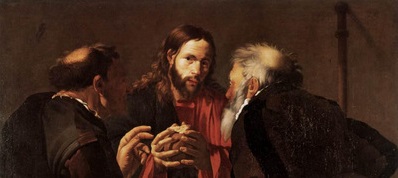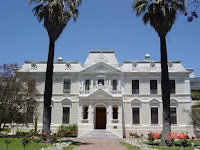I had the privilege of attending a New Testament Research seminar at Queens College, Oxford on 24 February 2010. Those attending included Prof. Christopher Rowland, Dr. Christopher Hays (Keble College) and several PhD students of Prof. Markus Bockmeul.
In his paper: Towards a liberating missional-incarnational ethos in John 4, Dr. Kobus Kok (Senior Lecturer from the University of Pretoria, South Africa), applied a relatively new development in New Testament studies dealing with implicit ethics to the story of the Samaritan women in John 4. (If memory serves me well, implicit New Testament ethics is developed by the likes of David Horrell, Michael Wolter, Ruben Zimmermann and Jan van der Watt). Kobus argued persuasively that John 4 can be interpreted as the "concrete crossing of boundaries in cultural perspective and the concrete embodiment of a lived Christ-like ethos that flows from an understanding of God's mission in the world." The implicit ethos found in John 4 motivates behaviour and creates a "particular symbolic universe which revolves around the continuing missional motive that started with the mission of Jesus." In my view, Kobus persuasively challenged the traditional view espoused by the likes of Meeks (1996:317), Schrage (1988:297) and Matera (1996:92) that there is no ethics to be found in the Gospel of John.
Simon, an Oxford PhD student presented a provocative and experimental paper in which he analysed the history of Jewish reconstructions of the Apostle Paul in order to challenged the status quo of historical-critical scholarship. He engaged with the likes of Jacob Taubes, Claude Montefiore, Martin Goodman, Friedrich Nietzsche etc. Simon gave an informative analysis of Taubes in particular, focussing not just on his academic work, but also engaging with biographical and sociological dimension which informed his reconstruction of the Apostle Paul. Simon's analysis indicated how these (and other) factors influenced Travis' reconstruction of Paul.
In the end, Simon argued that the objectivity of historical-critical scholarship must be challenged, given his analysis of the hegemony such scholarship has produced since the Enlightenment. Traditional historical-critical scholarship represents a "self-absorbed fantasy". We must "remove the halo" from the "head" of historical-critical scholarship, he said.
*These very brief remarks are certainly not a fair representation of the nuanses and depth of the papers presented. It is only a few snipets which I found interesting.
Photo below (from left to right): Ben (PhD student), Dr. Christopher Hays and Prof. Christopher Rowland.












